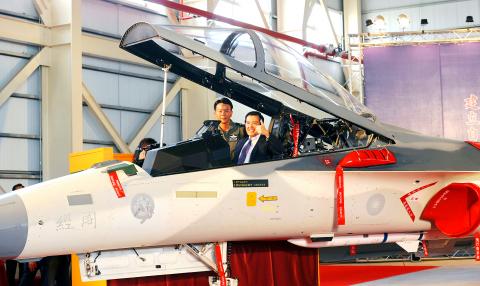With efforts to acquire F-16C/D aircraft from the US in limbo, the air force was yesterday given a shot in the arm when it received the first six of a planned 71 upgraded multi-role Indigenous Defence Fighters (IDF).
The F-CK-1A/B MLU (“mid-life upgrade”) was unveiled during a handover ceremony at the Aerospace Industrial Development Corp (AIDC, 漢翔航空) plant in Shalu (沙鹿), Greater Taichung, attended by top brass and scores of politicians, including President Ma Ying-jeou (馬英九), Deputy Minister of National Defense Chao Shih-chang (趙世璋) and Taichung Mayor Jason Hu (胡志強).
Years in the making, the upgrade involves a revamping of the aircraft’s avionics and flight control systems, a triple-color heads-up display and anti-electronic jamming functions, as well as the full integration of air-to-ground and air-to-air missiles developed by the Chungshan Institute of Science and Technology (中山科學研究院), such as the Tien Chien II “Sky Sword.”

Photo: Sam Yeh, AFP
It is reported that the aircraft will also be fit to carry the Tien Chien IIA anti-radiation missile, which remains under development. The aircraft can now carry four air-to-air missiles, from two on the original model.
Although it had been previously reported that the upgraded aircraft would have a greater operational range, the range is unchanged, and the twin Honeywell F125-70 afterburning turbofan engines are the same as on the original model.
The first six revamped aircraft, which are part of a US$588 million first phase of upgrades, are to join the 443 Tactical Fighter Wing in Greater Tainan.
Shiah Kang (夏康), senior vice president at state-owned AIDC, told the Taipei Times that between 28 and 30 F-CK-1A/B MLUs were scheduled for delivery this year, with the remainder due by the end of next year.
Shiah said that depending on the budget, the remainder of the IDFs in the air force, or 56 aircraft, could be upgraded as part of an MLU-2 program.
Under phase two of the project, AIDC would provide the air force with a range of options to meet a variety of tactical requirements, he said.
Addressing the ceremony, Ma said that when the IDF, a domestic program, was being developed in the 1980s after the US refused to sell Taiwan F-20s and F-16s, skeptics would jest that IDF stood for “I don’t fly.”
Over the years, the meaning of the acronym has changed and I hope it can now stand for “I do fight” and “I don’t fail,” Ma said.
The initial IDFs were introduced to the air force in 1994, with the first revamping program launched in 2000.
While the upgrade points to advances in Taiwanese avionics and capabilities, defense experts and Lockheed, maker of the F-16, say the new IDF is insufficient to ensure parity with an increasingly modern People’s Liberation Army Air Force.
In addition to the IDF program, a US$4.5 billion plan to upgrade Taiwan’s fleet of 144 F-16A/Bs is expected to commence later this year or next year.

SECURITY: As China is ‘reshaping’ Hong Kong’s population, Taiwan must raise the eligibility threshold for applications from Hong Kongers, Chiu Chui-cheng said When Hong Kong and Macau citizens apply for residency in Taiwan, it would be under a new category that includes a “national security observation period,” Mainland Affairs Council (MAC) Minister Chiu Chui-cheng (邱垂正) said yesterday. President William Lai (賴清德) on March 13 announced 17 strategies to counter China’s aggression toward Taiwan, including incorporating national security considerations into the review process for residency applications from Hong Kong and Macau citizens. The situation in Hong Kong is constantly changing, Chiu said to media yesterday on the sidelines of the Taipei Technology Run hosted by the Taipei Neihu Technology Park Development Association. With

CARROT AND STICK: While unrelenting in its military threats, China attracted nearly 40,000 Taiwanese to over 400 business events last year Nearly 40,000 Taiwanese last year joined industry events in China, such as conferences and trade fairs, supported by the Chinese government, a study showed yesterday, as Beijing ramps up a charm offensive toward Taipei alongside military pressure. China has long taken a carrot-and-stick approach to Taiwan, threatening it with the prospect of military action while reaching out to those it believes are amenable to Beijing’s point of view. Taiwanese security officials are wary of what they see as Beijing’s influence campaigns to sway public opinion after Taipei and Beijing gradually resumed travel links halted by the COVID-19 pandemic, but the scale of

A US Marine Corps regiment equipped with Naval Strike Missiles (NSM) is set to participate in the upcoming Balikatan 25 exercise in the Luzon Strait, marking the system’s first-ever deployment in the Philippines. US and Philippine officials have separately confirmed that the Navy Marine Expeditionary Ship Interdiction System (NMESIS) — the mobile launch platform for the Naval Strike Missile — would take part in the joint exercise. The missiles are being deployed to “a strategic first island chain chokepoint” in the waters between Taiwan proper and the Philippines, US-based Naval News reported. “The Luzon Strait and Bashi Channel represent a critical access

Pope Francis is be laid to rest on Saturday after lying in state for three days in St Peter’s Basilica, where the faithful are expected to flock to pay their respects to history’s first Latin American pontiff. The cardinals met yesterday in the Vatican’s synod hall to chart the next steps before a conclave begins to choose Francis’ successor, as condolences poured in from around the world. According to current norms, the conclave must begin between May 5 and 10. The cardinals set the funeral for Saturday at 10am in St Peter’s Square, to be celebrated by the dean of the College